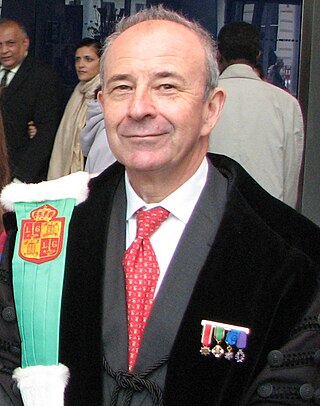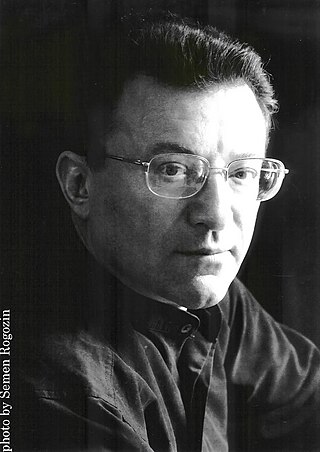Related Research Articles

Jürgen Schmidhuber is a German computer scientist noted for his work in the field of artificial intelligence, specifically artificial neural networks. He is a scientific director of the Dalle Molle Institute for Artificial Intelligence Research in Switzerland. He is also director of the Artificial Intelligence Initiative and professor of the Computer Science program in the Computer, Electrical, and Mathematical Sciences and Engineering (CEMSE) division at the King Abdullah University of Science and Technology (KAUST) in Saudi Arabia.
Michael Irwin Jordan is an American scientist, professor at the University of California, Berkeley and researcher in machine learning, statistics, and artificial intelligence.
The expression computational intelligence (CI) usually refers to the ability of a computer to learn a specific task from data or experimental observation. Even though it is commonly considered a synonym of soft computing, there is still no commonly accepted definition of computational intelligence.
Frank Rosenblatt was an American psychologist notable in the field of artificial intelligence. He is sometimes called the father of deep learning for his pioneering work on neural networks.

Stephen Grossberg is a cognitive scientist, theoretical and computational psychologist, neuroscientist, mathematician, biomedical engineer, and neuromorphic technologist. He is the Wang Professor of Cognitive and Neural Systems and a Professor Emeritus of Mathematics & Statistics, Psychological & Brain Sciences, and Biomedical Engineering at Boston University.

Jacek M. Zurada serves as a Professor of Electrical and Computer Engineering Department at the University of Louisville, Kentucky. His M.S. and Ph.D degrees are from Politechnika Gdaṅska ranked as #1 among Polish universities of technology. He has held visiting appointments at Swiss Federal Institute of Technology, Zurich, Princeton, Northeastern, Auburn, and at overseas universities in Australia, Chile, China, France, Germany, Hong Kong, Italy, Japan, Poland, Singapore, Spain, and South Africa. He is a Life Fellow of IEEE and a Fellow of International Neural Networks Society and Doctor Honoris Causa of Czestochowa Institute of Technology, Poland.

Sami Erol Gelenbe, a Turkish and French computer scientist, electronic engineer and applied mathematician, pioneered the field of Computer System and Network Performance in Europe. Active in European Union research projects, he is Professor in the Institute of Theoretical and Applied Informatics of the Polish Academy of Sciences (2017-), Associate Researcher in the I3S Laboratory and Abraham de Moivre Laboratory. Previous Chaired professorships include the University of Liège (1974-1979), University Paris-Saclay (1979-1986), University Paris Descartes (1986-2005), ECE Chair at Duke University (1993-1998), University Chair Professor and Director of EECS, University of Central Florida (1998-2003), and Dennis Gabor Professor and Head of Intelligent Systems and Networks, Imperial College (2003-2019).
A native of Terre Haute, Indiana, Stuart E. Dreyfus is professor emeritus at University of California, Berkeley in the Industrial Engineering and Operations Research Department. While at the Rand Corporation he was a programmer of the JOHNNIAC computer. While at Rand he coauthored Applied Dynamic Programming with Richard Bellman. Following that work, he was encouraged to pursue a Ph.D. which he completed in applied mathematics at Harvard University in 1964, on the calculus of variations. In 1962, Dreyfus simplified the Dynamic Programming-based derivation of backpropagation using only the chain rule. He also coauthored Mind Over Machine with his brother Hubert Dreyfus in 1986.
Hava Siegelmann is a professor of computer science. Her academic position is in the school of Computer Science and the Program of Neuroscience and Behavior at the University of Massachusetts Amherst; she is the director of the school's Biologically Inspired Neural and Dynamical Systems Lab and is the Provost Professor of the University of Massachusetts. She was loaned to the federal government DARPA 2016-2019 to initiate and run their most advanced AI programs including her Lifelong Learning Machine (L2M) program. and Guaranteeing AI Robustness against Deceptions (GARD). She received the rarely awarded Meritorious Public Service Medal — one of the highest honors the Department of Defense agency can bestow on a private citizen.
Ron Sun is a cognitive scientist who made significant contributions to computational psychology and other areas of cognitive science and artificial intelligence. He is currently professor of cognitive sciences at Rensselaer Polytechnic Institute, and formerly the James C. Dowell Professor of Engineering and Professor of Computer Science at University of Missouri. He received his Ph.D. in 1992 from Brandeis University.

Leonid Perlovsky is an Affiliated Research Professor at Northeastern University. His research involves cognitive algorithms and modeling of evolution of languages and cultures.
Gail Alexandra Carpenter, Ph.D is a cognitive scientist, neuroscientist and mathematician. She is now a "Professor Emerita of Mathematics and Statistics, Boston University." She had also been a Professor of Cognitive and Neural Systems at Boston University, and the director of the Department of Cognitive and Neural Systems (CNS) Technology Lab at Boston University.
Informatics is the study of computational systems. According to the ACM Europe Council and Informatics Europe, informatics is synonymous with computer science and computing as a profession, in which the central notion is transformation of information. In other countries, the term "informatics" is used with a different meaning in the context of library science, in which case it is synonymous with data storage and retrieval.
Erkki Oja is a Finnish computer scientist and Aalto Distinguished Professor in the Department of Information and Computer Science at Aalto University School of Science. He is recognized for developing Oja's rule, which is a model of how neurons in the brain or in artificial neural networks learn over time.

Alexander Nikolaevich Gorban is a scientist of Russian origin, working in the United Kingdom. He is a professor at the University of Leicester, and director of its Mathematical Modeling Centre. Gorban has contributed to many areas of fundamental and applied science, including statistical physics, non-equilibrium thermodynamics, machine learning and mathematical biology.

Amir Hussain is a cognitive scientist, the director of Cognitive Big Data and Cybersecurity (CogBID) Research Lab at Edinburgh Napier University He is a professor of computing science. He is founding Editor-in-Chief of Springer Nature's internationally leading Cognitive Computation journal and the new Big Data Analytics journal. He is founding Editor-in-Chief for two Springer Book Series: Socio-Affective Computing and Cognitive Computation Trends, and also serves on the Editorial Board of a number of other world-leading journals including, as Associate Editor for the IEEE Transactions on Neural Networks and Learning Systems, IEEE Transactions on Systems, Man and Cybernetics (Systems) and the IEEE Computational Intelligence Magazine.

Janusz Kacprzyk is a Polish engineer and mathematician, notable for his contributions to the field of computational and artificial intelligence tools like fuzzy sets, mathematical optimization, decision making under uncertainty, computational intelligence, intuitionistic fuzzy sets, data analysis and data mining, with applications in databases, ICT, mobile robotics and others.
Donald C. Wunsch II is Mary K. Finley Distinguished Professor of computer engineering at the Missouri University of Science and Technology, and a Fellow of the Institute of Electrical and Electronics Engineers He is known for his work on " hardware implementations, reinforcement and unsupervised learning".

Lyle Norman Long is an academic, and computational scientist. He is a Professor Emeritus of Computational Science, Mathematics, and Engineering at The Pennsylvania State University, and is most known for developing algorithms and software for mathematical models, including neural networks, and robotics. His research has been focused in the fields of computational science, computational neuroscience, cognitive robotics, parallel computing, and software engineering.
Alma Yolanda Alanís García is a Mexican electrical engineer and control theorist specializing in intelligent control, and in particular in the use of artificial neural networks for applications including the control of electric motors, robot manipulators, and unmanned aerial vehicles. She is a chair professor and researcher in the Department of Computational Sciences at the University of Guadalajara.
References
- ↑ Robert Kozma. "VITA – ROBERT KOZMA" (PDF). Retrieved 25 May 2010.
- ↑ Neuropercolation Article on Scholarpedia
- ↑ "author:"Robert Kozma"– Google Scholar" . Retrieved 25 May 2010.
- ↑ author:"Robert Kozma" – Google Books . Retrieved 25 May 2010.